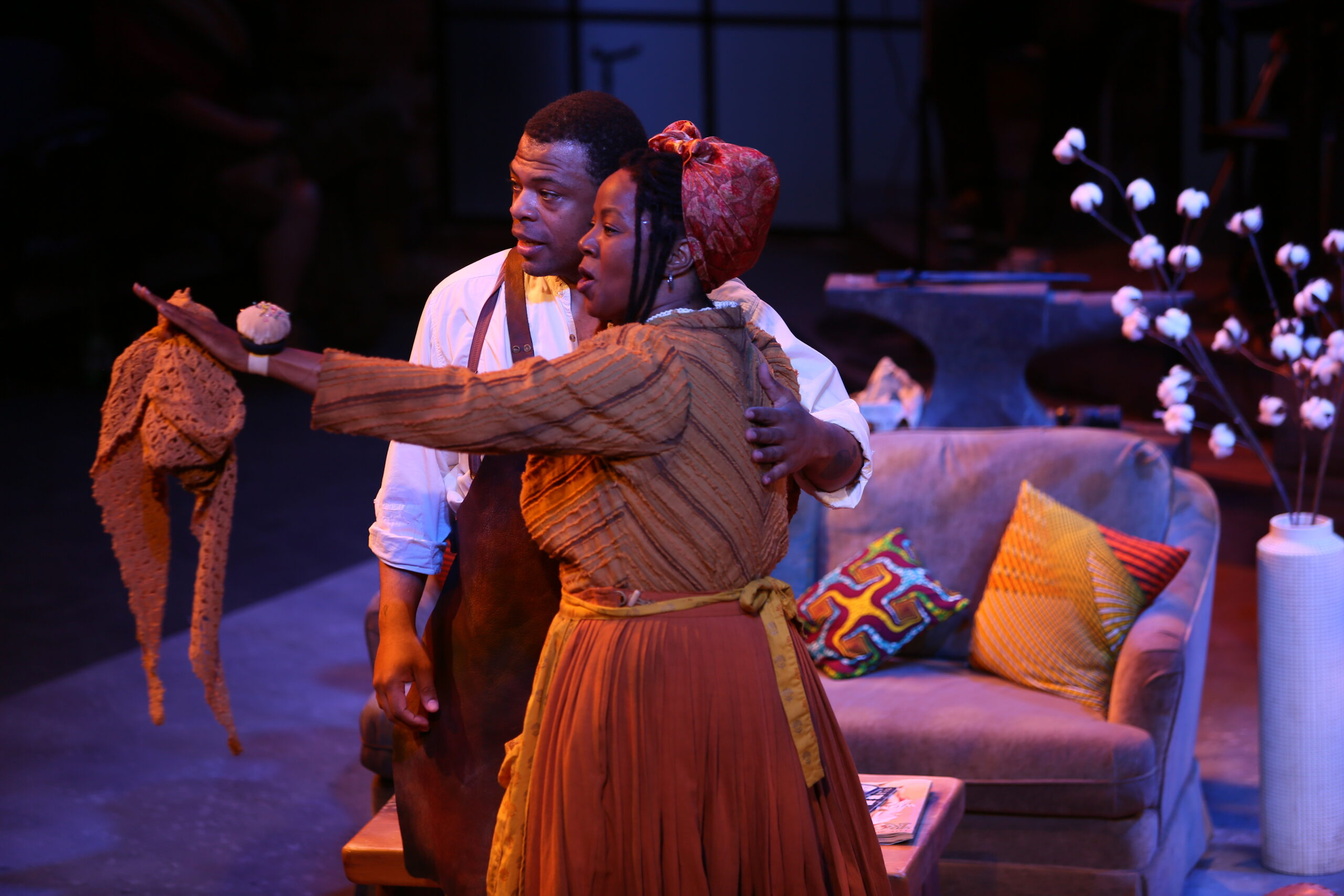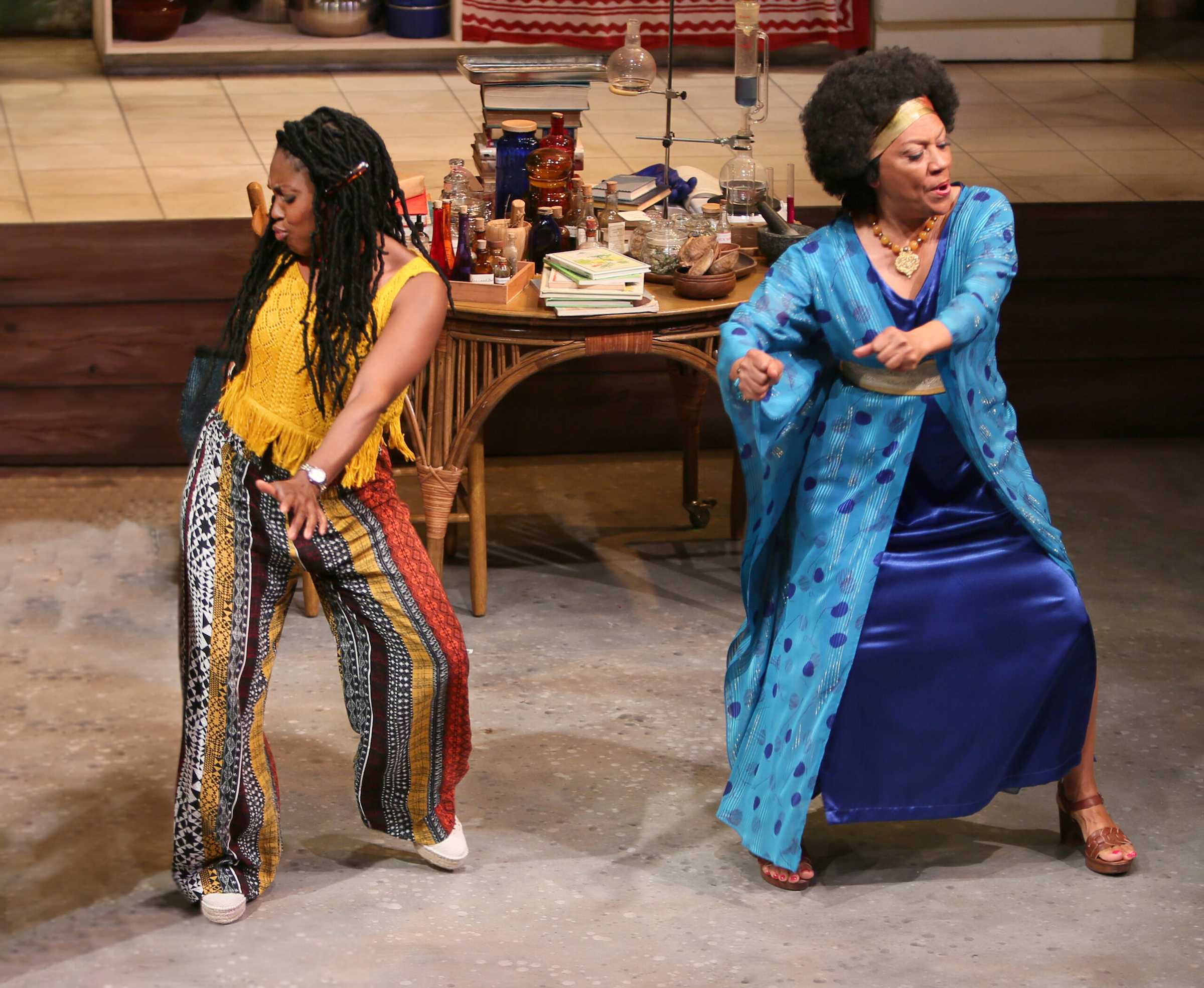
Credit: Emily Cooper
Bard on the Beach until July 17, 2022
Tickets from $27 at bardonthebeach.org or 604-739-0559
Posted June 30, 2022
I loved Harlem Duet. The script is honest and sad, sometimes funny and often poetic: “Do you prepare her bed, deep in fragrant posies, rosemary, forget-me-nots and roses, anoint her feet with civet oil, lotus musk and perfumes . . . ” It’s deeply political as well as deeply personal. The production is terrific, the direction – by Cherissa Richards – is sensitive and the acting superb. A little bit of Lady Macbeth and a little bit of Othello (including the ripe strawberry-embroidered handkerchief) make it a good fit for Bard. A touch of Medea makes it timeless. And a whole lot of Martin Luther King makes it politically relevant.
Betrayal is at the heart of Harlem Duet and what a betrayal it is: not a person in the audience who has ever felt betrayed in love will fail to feel the twist of the knife. Tennessee Williams used to speak of the ‘universal sob’ when an audience – as one – feels sorrow. Playwright Djanet Sears sets up a moment when the audience – as one – feels red-hot rage.

Credit: Tim Matheson
Sears’ play takes place mainly in 1997 but also, briefly, in 1860 in the pre-emancipation US south, and in 1928 New York during the Harlem Renaissance. In 1860, “Her” and “Him” are slaves bent on escaping to Canada; in 1928 the characters are “She” and “Him”, hanging out in Harlem. He is an actor, preparing to do a black face part in a minstrel show. He’s having an affair with a white woman and She is devastated. “You love her.” “Yes. Yes. Yes.” “Is she white?” “She’s white”.
In 1997, Billie and Othello are in post-civil rights Harlem and thirty years have passed since the assassination of Martin Luther King. (Voice-overs between scenes of King’s passionate rallying speeches remind us of his dreams of justice and equality for African-Americans.)
Billie is a graduate student and Othello is a professor; they have been together for 9 years. Othello, however, is having an affair with Mona, a white colleague and he is in the process of moving out. “Do you love her?” “Yes.” “Is she white?” “Yes”.

Credit: Tim Matheson
Billie, in her fury, finds the affair not only a personal betrayal but a political one. She is enraged when Othello tells her white women are “easier”. Billie is not easy. Mona will bring her own baggage into the relationship with Othello but it won’t be a history of slavery and the fight for equal rights. Billie is steeped in history, raw with the inequality of black Americans and vocal about it – very vocal. After Othello comes clean about the affair, Billie, inconsolable, takes to her bed and plots revenge which we see in a couple of fantasy sequences.
Marci T. House is stellar as She, Her and especially as Billie. She makes Billie’s fury palpable – a monstrous betrayal that simply must be addressed. House gives us an intelligent, articulate, politically astute character that is also so human, so vulnerable, so stricken by anger and grief.
Othello (portrayed by Donald Sales) is no match for Billie until late in the play when he tries to explain himself. “I’m an American. The slaves were freed over 130 years ago. In 1967 it was illegal for a black to marry a white in sixteen states. Things change, Billie. I am not my skin. My skin is not me.” Sales makes Othello’s defence real and forces us to reconsider Billie’s position. Has Othello moved on and has Billie not?

Credit: Tim Matheson
Harlem Duet is not all fury, rage and betrayal. Liza Huget, as Magi, Billie and Othello’s man-hunting landlady, is flirtatious, funny and dynamic. Not that Magi is shallow; she’s not. She’s just made her peace with the way things are and is moving on.
The same is true for Amah (Marsha Regis), Billie’s sister-in-law. Amah doesn’t figure hugely in the narrative but interacts with Magi to provide levity.
A late appearance is Billie’s father Canada (Tom Pickett) who comes from Nova Scotia to console Billie; Amah has tipped him off. Pickett’s performance is sweet and low-key, like a balm to Billie’s fiery rage.

Credit: Tim Matheson
Set and costumes by Rachel Forbes give a sense of time and place; composer John ‘Adidam’ Littlejohn and musicians Alexander Boynton Jr. and Marlene Ginader provide live music to enhance the production. It’s Harlem, after all!
As with Shakespeare’s Othello, Harlem Duet raises so many questions about race and love. In Harlem Duet, Othello believes – or tries to believe – we are all the same: black or white. Reality tells a different story: more African Americans die at the hands of US police, more African Americans fill US jails. Billie is still embroiled in the ongoing fight for justice – at her peril. Playwright Sears doesn’t provide answers and we are left weighing the issues. Harlem Duet is definitely not black and white but thoughtfully provocative.

